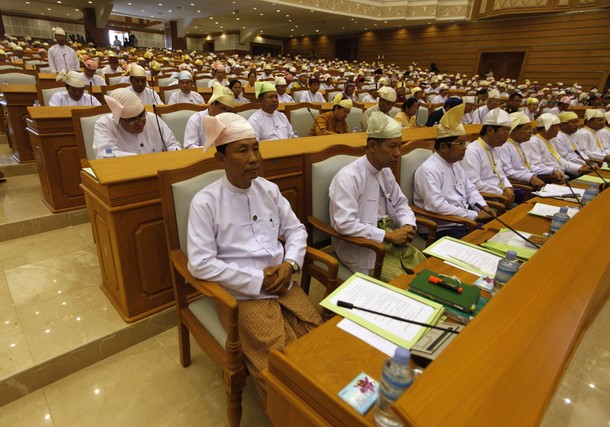Ten MPs took to the floor of the lower house of Burma’s parliament on Friday as debate commenced on whether to employ a system of proportional representation (PR) in future general elections.
A motion to replace the first-past-the-post system with PR was already debated and approved by the upper house by a vote of 177 to 85 (with three abstaining) last month.
On the first day of the debate in the lower house, five MPs spoke in support of the motion to adopt PR, while five spoke against the change.
According to National League for Democracy (NLD) MP Min Thu, some 50 parliamentarians will be afforded the opportunity to address the house over the coming week with parties in support of the motion and those against given equal time to address parliament.
“Today, U Win Myint and Daw Khin Thandar from the NLD spoke against changing our electoral system to PR,” said the Uttara Thiri constituency MP. “They were joined by U Khun Laing from the Chin National Party and one representative each from the Phalon-Sawaw Democratic Party and the Chin Progressive Party in speaking out against the motion.”
[related]
He said that, on the pro-PR side, two MPS from the Union Solidarity and Development Party, Thein Htun Oo and Thar Win, addressed the lower house, followed by Nyan Swe Win from the National Unity Party, Daw Dwebu from the Unity and Democratic Party of Kachin State, and one unnamed MP from Chibwe Township.
Min Thu said that although Kachin MP Daw Dwebu spoke in favour of a PR system, she said it is not yet appropriate to employ this method in ethnic areas.
“In Kachin State, some constituencies had no elections [in 2010] for security reasons,” she is reported to have said. “So although a PR system is preferable, our situation is not yet ripe for this change.”
Aung Zin, an MP with the National Democratic Front, the party which originally proposed the PR motion, echoed her sentiments. He said that his party supported the adoption of PR, but that ethnic states should be excluded.
Speaking to DVB on Friday, Ko Ko Gyi of the 88 Generation civil society group, opined that that Burma was still too young in its transition to democracy to consider an immediate switch to PR.
“The public must understand the pros and cons of the electoral systems,” he said. “There should be a wide range of discussions, and commissions formed at different levels. We need a period of time to discuss the PR issue. We are still at a stage where the status of representation in parliament is questionable. For an important change like this, we must debate long and hard. We should not rush into this.”



